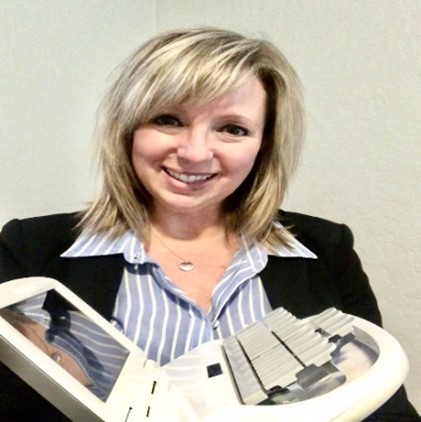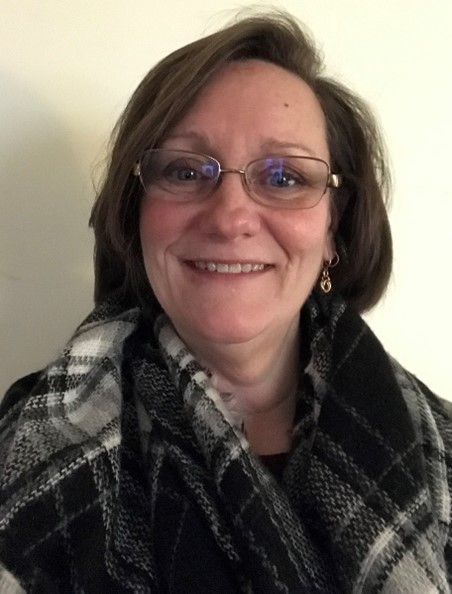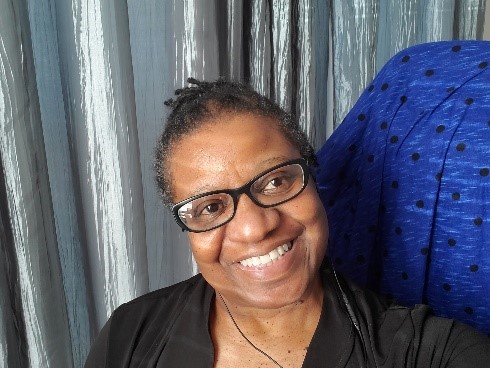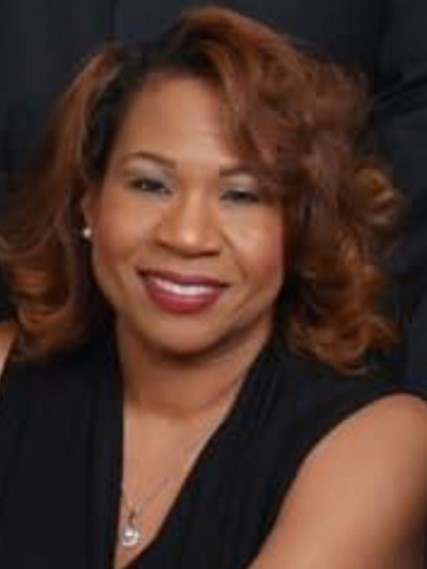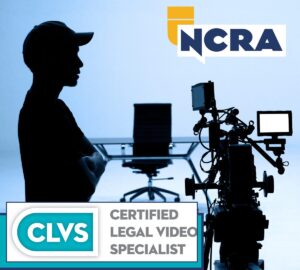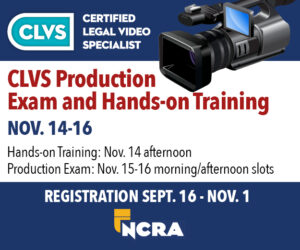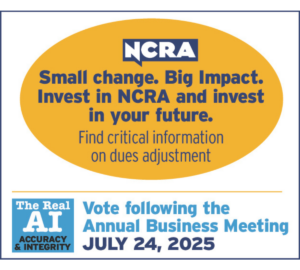By Margary Rogers
Are you a seasoned reporter who has been thinking about obtaining more certifications but are hesitant about the online testing process?
Since I started the Stenographers Leveling up with Certifications Facebook Group and the Certified Realtime Reporter (CRR) Practice Group, I have met and had many conversations with court reporters, including several seasoned reporters, who are “getting back into the groove of testing.” Below are some of the many testimonials I have heard, and I thought these stories may inspire others.
If you are a reporter who has not tested in more than 20 years, like these reporters, fear no more! These reporters will inspire you to get back into the groove to obtain certifications. It’s never too late to level up with certifications.
Margary Rogers, RPR, CRI, is an official court reporter and CART captioner based in Washington, D.C. She can be reached at mfrogers1@gmail.com.
Certification reimagined
By Tamara Mendoza Sumpter
The year was 1992. California was teasing us with a fall cooling, as she likes to do just before mid-October breathes out a heat wave. Consumed by fear, trembling, in my flip-flops and sweatshirt, I entered the banquet room of a Southern California hotel to try my hand at the Certified Shorthand Reporter (CSR) test. After months awaiting the results, the new year brought written confirmation that I was officially a CSR and that my testing days were permanently behind me — and for another quarter century they were.
The reasons for not seeking new certifications were many: Crippling anxiety marked by fingers sweating off the keys and the feeling that fainting was imminent; a successful career sans certifications; complacency; and self-doubt. When talking about a realtime certification, I once was asked by one of my favorite young reporters, “Aren’t you too old for that?” And, yes, that is a verbatim recitation of that statement.
Enter spring of 2020 and the months we all learned that we are resilient beings and capable of morphing and changing in ways we never imagined. In May, I hung up my freelancer/firm owner hat and went to work for the Tulare County Superior Court as an official, an official that had the opportunity to receive a pay raise with a CRR certification. In the fall of 2020, my love of (or need for) the almighty dollar demanded that I join NCRA, push through my anxiety, and sign up for the first leg of the Registered Professional Reporter (RPR) certification.
I lived 27 years believing I was a terrible tester, referring to myself as such based justifiably and undeniably on the fact that in school I was. But guess what, fellow reporters? As the seasons change, so do we. Every day we put our fingers on our machines, we are becoming stronger, more confident writers. Every day we struggle through a difficult job, we are becoming faster and improving our muscle memory. We need not saddle ourselves with negative internal dialogue formed in the dawn of our reporting lives.
Why not reframe the way you talk about your skills in your head? Why not focus on the pride you’ll feel when passing a test? Why not pick a date on your calendar and begin your six-month countdown to a new certification? Why not reimagine yourself as a CRR, CRC, RMR, or RDR? Thanks in no small part to Margary Rogers, RPR, CRI, and the virtual test prep classes she hosts, by the spring of this year I had successfully earned two new certifications and am now officially Tammi Sumpter, CSR, RPR, CRR, a capable, adept test taker.
Tamara Mendoza Sumpter, RPR, CRR, is an official and freelance reporter living in Visalia, Calif.
Testing 30 years later
By Roberta Turner
My first introduction to court reporting came when I was in ninth grade. I remember a lady coming to my high school and showing off her manual writer — Yes, it was a manual writer! This machine had no letters, no screen to read from, just paper. It reminded me of a calculator, just bigger. I guess at that age it was interesting, but also, as she left the classroom, so did my interest.
Fast forward to age 23. A childhood friend (Shawn Bivens) came by for a visit; new car, looking very professional. She shared that she was a court reporter. This took me back to ninth grade, except I learned from her how long it took her to get through school and how the income was unlimited. Now that I was married with two kids, oh, I was interested.
I started court reporting school in Kansas City, Mo., in the fall of 1987. It took me two and a half years to finish school. I became pregnant my last year of school. I remember thinking after graduating school: “Now I need to find a job.” They expressed in school that you had to have your RPR certification to secure a job in the state of Missouri. I set out to take the exam. I passed the written exam on my first try, but I did not pass the skills portion. I sent out more than 10 resumes seeking employment, and I was able to get a job in Florida, no RPR certification required. However, I did not feel I was at my full potential without that certification, so I continued to go after it — not for work, but for myself. I had another reporter who would take the test at the same time. We would ride together twice a year trying to pass that skills portion, with our computer tower, monitor, typewriter, and printer.
We would always get to the testing facility early so that we could sit where we chose. Soon the room would fill with anywhere from 20 to 30 others. Before testing, the room would be loud, with some people socializing, although others had earphones on and were practicing before the test. It was nerve-racking. All you heard was a bunch of noise, writers clacking loudly. You would move from one room to the other until you had taken all three legs of the skills portion, after which you moved to another room where all your equipment was to transcribe from your notes onto a manual typewriter. You were basically at the testing facility all day from 9 a.m. to 3 p.m., totally exhausted and wiped out on a Saturday. After the third time testing with my girlfriend, she finally threw in the towel. However, I was not a quitter. I felt that as long as someone passed, it meant that it was passable, and I was going to pass. I finally passed in 1999 on my fourth try. I was so proud of myself for sticking to it. And after all those times, the expense of taking the test, my Saturdays missed, I was done. RPR in hand, I felt good.
Fast forward to when realtime hit the profession. I heard about attorneys in big cases requesting the skill. I saw reporters making more money, and I was left out. So I started going to Anita Paul’s realtime seminars. I then started cleaning up my writing, because when I went to school, we wrote everything out. We were taught maybe five briefs, e.g., contributory negligence, preponderance of the evidence. I had conflicts all throughout my dictionary (there/their/they’re, affect/effect). I had my work cut out for me, but I needed to get realtime ready. Now, with my dictionary cleaned up and no conflicts and providing realtime to clients, I knew it was time to test. I took the realtime test twice in a brick-and-mortar setting. Disappointed I did not pass, I soon stopped testing and let that dream go by the wayside. After all, I was getting paid to do it. But in my heart of hearts, I wanted that license. I felt that would be my confirmation that I was capable of providing that service.
When COVID-19 entered the scene, it changed everything. Now I am working from home, which is giving me more time to practice and work on getting my CRR certification. I got together with some other reporters and said: “Why don’t we come out on the other side of COVID-19 with some certifications?”
My whole perspective has changed after almost 30 years of testing for that RPR. Not only am I going for that CRR certification, but my RMR and all those certs that are out there. I guess for me it is not that any of these certifications are requested from most agencies, but they are goals I have set for myself. And during this COVID-19 pandemic, I have met more goal-minded court reporters than I have met in all my 30 years of reporting.
There are so many platforms to practice on with other reporters. Nothing is stopping you from getting your certifications but you. And at least this time around, I can focus on one or two tests at a time and pass them one at a time as well, whereas before you had to pass all three legs in one sitting. I look forward to practicing every day. Remember, anyone good at something became that way from practicing. Hard work does pay off and makes it sweeter when you accomplish a goal you set out for yourself.
Roberta Turner, RPR, is a freelancer and agency owner in Orlando, Fla.
I knew that I had truly earned the CRC title
By Catherine L. Zelinski
I “finished” court reporting school when I was 21. If you passed your 225 test in school, agencies were recruiting you because they needed stenographers to work. I started working for the first agency that called me. I sat for my state’s certification test five times before giving up. Each time I took the test, I would fail by one or two errors. My thought was that I would work and try again at passing the test. Life happened, and the test was always pushed to the bottom of the list.
I worked as a freelance court stenographer for 19 years before attending a workshop for CART. There was a test at the end of the workshop. Again, I missed passing by one or two errors. The trainer said I had the skill to provide CART captions. She assured me that my errors were just nerves. She encouraged me to take the national certification soon after. I worked both as a court stenographer and as a CART provider after that training. Sometime after, I sat for my state’s certification exam. I passed the state certification in one sitting.
Last spring, when things were shut down because of the pandemic, I was nervous that I would be out of a job. I attended many state associations’ virtual seminars. The speakers taught us many things, but one thing that was repeated was how important it is to have a certification. I knew they were right.
With the profession being challenged by digital recorders and artificial intelligence/voice recognition, I knew deep down I needed to get a national certification. How in the world could I achieve this goal now? At my age? I’ve been working in this field for 35 years. With that many years, you develop bad habits with your writing. You also lose your speed. Passing a test at my age seemed next to impossible.
I was providing CART captions to colleges remotely and working for organizations who now wanted to be accessible on Zoom. They found that AI was not what they thought it would be. Here was an opportunity to start to promote the profession. I didn’t feel I was credible without that certification.
When I got an email from NCRA that registration was open for testing, I signed up. Now I was committed. What in the world did I just do? I needed to find time to practice. When I started looking at the WKT study guide and workshop, some of the information seemed foreign to me. I remember sitting for a 200 wpm dictation and being blown away. It seemed like I missed every other word. The negative talk and lack of confidence settled in and here I was back to my 21-year-old self. I started to practice in between my classes. I got up early in the morning to practice. I started to clean up some of my writing. Eventually the 200 speed was within reach. I remember feeling positive. My writing got better as I practiced.
I registered for the CRC exam, not realizing I had to complete the workshop first. I chipped away at the workshop and learned so much. I passed the WKT section the first time I took it.
The skills test was not as easy for me. My first take, I panicked and closed out of the test without submitting my notes. I knew I had to try again. I felt good about that test. The second test I finished with a 94 percent. These two tests were fair and definitely passable. I knew I needed to pass the CRC skills without a struggle. The third test I took had a word that kept coming up that I knew was not defined in my dictionary. I made the decision to fingerspell it. It seemed like this word came up ten times. The nerves and test anxiety kicked in because I had to fingerspell that word each time it came up. I put my head down and focused. The test was submitted with a score of 96 percent. When the official result came in that I passed, it was such a relief. I knew that I had truly earned the CRC title.
I would encourage anyone out there who has put certification off to not give up.
Catherine L. Zelinski, CRC, is a CART captioner and freelancer in Norton, Mass.
Fast forward 35-plus years
By Juanita Price
The first stenographic test I took was the RPR exam back in the early/mid 1980s. I remember having to pack up my typewriter; my manual stenograph machine; steno pads (I always carried extra; I never knew if I would need them or someone else would); steno ribbon ink (don’t ink too much; it can cause a paper jam — and remember, you had to read and type from your raw notes); typing paper (yes, good ole regular typing paper); Wite-Out (unless you had a fancy typewriter that had the correction tape feature); dictionaries (Merriam-Webster, medical, legal); atlas; and most important, your registration letter, which was sent through the mail, along with some form of ID.
When the test would start, I would always do the best that I could. The three five-minute legs felt like they lasted an hour. It was only 15 minutes total, but the most important 15 minutes of a student reporter’s or young professional reporter’s career. I forget how long we had to transcribe it, but there was a deadline.
There were times I would pass two legs and fail one. Yes, it was a crushing blow. I had to pass all the legs at once. At the time, you couldn’t pass one leg at a time. And then it took weeks before I found out whether I passed or not.
The examiners never gave us any names beforehand of the parties, streets, landmarks, or places that might be frequently mentioned in any of the legs. So all I had was my skill of writing, no matter how long or short it was; that was fine, because that was all I needed. As the old adage goes: When in doubt, write it out! That skill never fails.
When I finished transcribing, I turned in my transcript, along with my steno notes attached and handed them to the proctor who, in turn, asked me if I wanted to review it again. If I said no, I had to haul all of my equipment and supplies back out of the room. And I had to do it quietly if I finished early so as not to disturb the other reporters.
I must say, in all honesty, carrying all of this equipment was never tiresome for me, because my family would help me bring it in. I became a memorable participant because of my family. I would get a light-hearted tease by other reporters and sometimes proctors who would say, “Here comes Juanita with her entourage!” I thank God my family was always eager to help (my day-one supporters were my mom, dad, sisters, brothers, nieces and nephews, cousins, aunts, and uncles.) You all thought I was joking when I said my family? No. Seriously, it was my family.
For those who have never experienced this, I am sure you are thinking that testing seems like a lot. It was, but it was fun, at least for me. Yes, it was very important, but still it was fun! My family always celebrated. Even if I felt that I did not pass, they would, of course, say: “You can do it! Study more.” And I in reply would tell them, “There is nothing to study; I just have to continue to practice.”
In my mind, I would not quit. I could not quit. I kept going until I passed, and I did.
When I got the news I passed my test, my family was there for me, and we went out and had a big luncheon celebration. Wow! Those were the days. They were exciting and fun!
More than 35 years later, oh, my goodness! What a technological world we live in! I must say I felt a little intimidated by taking on the task of online testing.
Testing day now goes like this: I enter a room in my home, clear everything off my desk, open the curtains, have my webcam ready, my laptop connected to my computerized stenograph machine (a Luminex I named Smokie), a sheet of paper, a pen, and that is all. No family around for me.
I log into ProctorU, wait for a proctor so they can check my room (360° degrees as well as under my desk, all doors must be closed in my room) and ID, view my equipment (Stenograph machine and keyboard of laptop). Then the proctor will navigate me to the necessary windows so I can begin the test.
I can take my test in various ways. I can take just one leg during a testing window, or all three at different times in the allotted time of the testing window. It’s less cumbersome; I don’t need a lot of equipment; and I find out within seconds of uploading my steno notes and a copy of my transcript whether or not I passed.
Now, I have to admit it took time to get used to having to interact with the proctors and having to show my writing while I test. My first thought was: Seriously? I embraced it, though. So I recently began to tackle the online testing by pretending I am writing for one of my deaf/hard-of-hearing consumers. I have been successful with that at certain speeds, but when it comes to the higher speeds, I have received, in the words of NCRA President Debbie Dibble, RDR, CRR, CRC, a NO PASS. I remembered, Debbie!
I am confident I will master a calmness while taking these online tests so that I will be able to obtain the RMR and CRC certifications that I am in hot pursuit of.
Juanita Price, RPR, is an official and CART captioner in Manassas, Va.
Testing after 20 years
By Kim Folds
I have been an official court reporter in Milwaukee, Wis., since 1999. During that time, it was a requirement for all reporters to be certified as an RPR to be assigned to a judge as his personal appointee. Needless to say, preparing and taking the RPR exam was challenging. I remember signing up twice a year on a Saturday in May or November, and you had to select which test site you preferred.
As an official court reporter, I’ve always wanted to earn more certifications, but with starting a new career, being a wife and a mom, I didn’t make it a priority.
Now here I am more than 20 years later, and I’ve decided to take that plunge and earn more certifications. I have to admit the idea of testing online seemed so intimidating. The practicing aspect is the same. You have to practice every day to reach your goals of being certified. However, I can truly say that NCRA has made it very user-friendly and worthwhile taking a test through My Realtime Coach and ProctorU. It actually is more convenient for court reporters who have busy lives but still want to be relevant in their field, hone their skills, and become certified.
For me there is less pressure through online testing. The only pressure you have is the pressure you put on yourself. There are no distractions from other reporters writing in a room right beside you. There’s no waiting to take the test twice a year. Need I say more? I can, but I won’t.
I will conclude with this: It’s not too late to become certified and earn more letters behind your name, no matter how many years you’ve been reporting. I want to encourage any court reporter who knows what it’s like to take tests during the brick-and-mortar days to challenge yourself to take the steps to reach your goals and earn all the certifications you can and do it through NCRA’s online testing. I’m so grateful to have this opportunity to be able to test online, and I wouldn’t have it any other way.
Kim Folds, RPR, is an official from Milwaukee, Wis.
